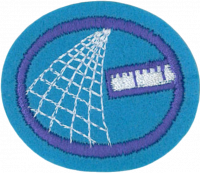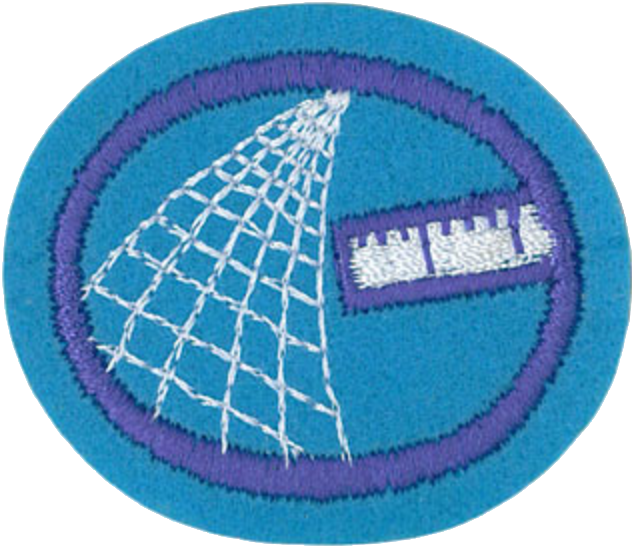Difference between revisions of "AY Honors/String Art/Answer Key/es"
From Pathfinder Wiki
< AY Honors | String ArtAY Honors/String Art/Answer Key/es
(Created page with "</noinclude> <!-- 2. Dibujar y coser en cartón en puntos espaciados a la misma distancia: -->") |
(Created page with "<noinclude>") |
||
| Line 20: | Line 20: | ||
{{CloseReq}} <!-- 2 --> | {{CloseReq}} <!-- 2 --> | ||
{{ansreq|page={{#titleparts:{{PAGENAME}}|2|1}}|num=3}} | {{ansreq|page={{#titleparts:{{PAGENAME}}|2|1}}|num=3}} | ||
| − | <noinclude> | + | <noinclude></noinclude> |
| − | </noinclude> | + | <!-- 3. Nombrar tres maneras de preparar la madera para arte en hilo. --> |
| − | <!-- 3. | ||
| − | |||
| − | |||
| − | |||
| − | |||
| − | |||
| − | |||
| − | + | {{clear}} | |
| − | |||
| − | |||
| − | + | {{clear}} | |
| − | |||
| − | |||
| − | + | {{clear}} | |
| − | |||
| − | |||
| − | + | {{clear}} | |
| − | |||
| − | |||
| − | + | <noinclude></noinclude> | |
| − | <noinclude | ||
| − | |||
{{CloseReq}} <!-- 3 --> | {{CloseReq}} <!-- 3 --> | ||
{{ansreq|page={{#titleparts:{{PAGENAME}}|2|1}}|num=4}} | {{ansreq|page={{#titleparts:{{PAGENAME}}|2|1}}|num=4}} | ||
| − | <noinclude> | + | <noinclude></noinclude> |
| − | </noinclude> | + | <!-- 4. Usando el método de trabajo de arte en hilo en madera, hacer cuatro de los siguientes: --> |
| − | <!-- 4. | + | <noinclude></noinclude> |
| − | <noinclude | ||
| − | |||
{{ansreq|page={{#titleparts:{{PAGENAME}}|2|1}}|num=4a}} | {{ansreq|page={{#titleparts:{{PAGENAME}}|2|1}}|num=4a}} | ||
| − | <noinclude> | + | <noinclude></noinclude><noinclude></noinclude> |
| − | </noinclude> | ||
| − | |||
| − | |||
| − | |||
| − | |||
| − | <noinclude | ||
| − | |||
{{CloseReq}} <!-- 4a --> | {{CloseReq}} <!-- 4a --> | ||
{{ansreq|page={{#titleparts:{{PAGENAME}}|2|1}}|num=4b}} | {{ansreq|page={{#titleparts:{{PAGENAME}}|2|1}}|num=4b}} | ||
| − | <noinclude> | + | <noinclude></noinclude> |
| − | </noinclude | + | <noinclude></noinclude> |
| − | |||
| − | |||
| − | |||
| − | |||
| − | |||
| − | <noinclude | ||
| − | |||
{{CloseReq}} <!-- 4b --> | {{CloseReq}} <!-- 4b --> | ||
{{ansreq|page={{#titleparts:{{PAGENAME}}|2|1}}|num=4c}} | {{ansreq|page={{#titleparts:{{PAGENAME}}|2|1}}|num=4c}} | ||
| − | <noinclude> | + | <noinclude></noinclude> |
| − | </noinclude | + | <noinclude></noinclude> |
| − | |||
| − | |||
| − | |||
| − | |||
| − | |||
| − | <noinclude | ||
| − | |||
{{CloseReq}} <!-- 4c --> | {{CloseReq}} <!-- 4c --> | ||
{{ansreq|page={{#titleparts:{{PAGENAME}}|2|1}}|num=4d}} | {{ansreq|page={{#titleparts:{{PAGENAME}}|2|1}}|num=4d}} | ||
| − | <noinclude> | + | <noinclude></noinclude> |
| − | </noinclude> | + | <noinclude></noinclude> |
| − | |||
| − | |||
| − | <noinclude | ||
| − | |||
{{CloseReq}} <!-- 4d --> | {{CloseReq}} <!-- 4d --> | ||
{{ansreq|page={{#titleparts:{{PAGENAME}}|2|1}}|num=4e}} | {{ansreq|page={{#titleparts:{{PAGENAME}}|2|1}}|num=4e}} | ||
| − | <noinclude> | + | <noinclude></noinclude> |
| − | </noinclude> | + | <noinclude></noinclude> |
| − | |||
| − | <noinclude | ||
| − | |||
{{CloseReq}} <!-- 4e --> | {{CloseReq}} <!-- 4e --> | ||
{{ansreq|page={{#titleparts:{{PAGENAME}}|2|1}}|num=4f}} | {{ansreq|page={{#titleparts:{{PAGENAME}}|2|1}}|num=4f}} | ||
| − | <noinclude> | + | <noinclude></noinclude> |
| − | </noinclude | ||
| − | |||
| − | |||
| − | + | {{clear}} | |
| − | |||
| − | |||
| − | + | <noinclude></noinclude> | |
| − | <noinclude | ||
| − | |||
{{CloseReq}} <!-- 4f --> | {{CloseReq}} <!-- 4f --> | ||
{{ansreq|page={{#titleparts:{{PAGENAME}}|2|1}}|num=4g}} <!--T:13--> | {{ansreq|page={{#titleparts:{{PAGENAME}}|2|1}}|num=4g}} <!--T:13--> | ||
| − | <noinclude> | + | <noinclude></noinclude> |
| − | </noinclude | + | <noinclude></noinclude> |
| − | |||
| − | |||
| − | |||
| − | <noinclude | ||
| − | |||
{{CloseReq}} <!-- 4g --> | {{CloseReq}} <!-- 4g --> | ||
{{ansreq|page={{#titleparts:{{PAGENAME}}|2|1}}|num=4h}} | {{ansreq|page={{#titleparts:{{PAGENAME}}|2|1}}|num=4h}} | ||
| − | <noinclude> | + | <noinclude></noinclude> |
| − | </noinclude> | ||
| − | |||
| − | |||
</gallery> | </gallery> | ||
| − | |||
| − | + | <noinclude></noinclude> | |
| − | <noinclude | ||
| − | |||
{{CloseReq}} <!-- 4h --> | {{CloseReq}} <!-- 4h --> | ||
{{CloseReq}} <!-- 4 --> | {{CloseReq}} <!-- 4 --> | ||
{{ansreq|page={{#titleparts:{{PAGENAME}}|2|1}}|num=5}} | {{ansreq|page={{#titleparts:{{PAGENAME}}|2|1}}|num=5}} | ||
| − | <noinclude> | + | <noinclude></noinclude> |
| − | </noinclude> | + | <!-- 5. Completar un arte original en hilo, en madera para mostrar o exhibir. --> |
| − | <!-- 5. | ||
| − | |||
| − | |||
| − | |||
| − | |||
| − | |||
| − | |||
| − | |||
| − | |||
| − | + | <noinclude></noinclude> | |
| − | <noinclude | ||
| − | |||
{{CloseReq}} <!-- 5 --> | {{CloseReq}} <!-- 5 --> | ||
| − | <noinclude> | + | <noinclude></noinclude> |
| − | </noinclude> | + | ==Referencias== |
| − | == | + | [[Category:Adventist Youth Honors Answer Book/es]] |
| − | + | <noinclude></noinclude> | |
| − | |||
| − | |||
| − | [[Category:Adventist Youth Honors Answer Book | ||
| − | <noinclude | ||
| − | |||
{{CloseHonorPage}} | {{CloseHonorPage}} | ||
Revision as of 21:18, 3 May 2021
1
Describir los siguientes: arte en hilo, simografía, puntadas geométricas.
2
Dibujar y coser en cartón en puntos espaciados a la misma distancia:
3
Nombrar tres maneras de preparar la madera para arte en hilo.
4
Usando el método de trabajo de arte en hilo en madera, hacer cuatro de los siguientes:
4a
Círculo relleno
4b
Círculo hueco
4c
Estrella
4d
Bordes
4e
Curva cóncava
4f
Curva convexa
4g
Relleno
4h
Ala tejida
</gallery>
5
Completar un arte original en hilo, en madera para mostrar o exhibir.


